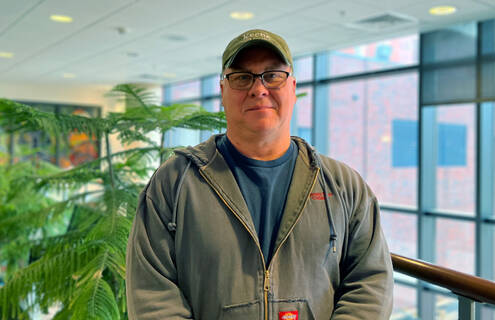
In January 2023, Robert Yeaw’s hands and feet began to feel numb.
Yeaw, 57, assumed the numbness was caused by a pinched nerve from a bad night’s sleep and continued with his normal day. Within a few days, he was having trouble walking and had muscle aches throughout his body, so he headed to an urgent care office outside of the Dartmouth Health system.
His blood work and scans came back normal and he was sent home. But his symptoms continued to worsen.
“It was like having a toothache through your whole body,” Yeaw said. “I couldn’t get comfortable.”
A few days later, he was completely unable to move his legs or stand. He was taken to Cheshire Medical Center’s Emergency Department for more testing and, hopefully, some answers.
He was told he had Guillain-Barre syndrome, a rare condition in which the body’s immune system attacks the nerves, causing weakness, numbness or paralysis.
The exact cause of the disease is unknown, but two-thirds of people experience symptoms of an infection in the weeks preceding the onset of Guillain-Barre symptoms. This was the case for Yeaw, who said he had a gastrointestinal infection before his diagnosis.
There is no cure for Guillain-Barre syndrome, but several treatment options can ease symptoms and help speed recovery. In most cases, people fully recover, but the time it takes to recover varies.
Yeaw would spend 50 days at Cheshire to recover. Most of that time was spent in Cheshire’s Inpatient Physical Rehabilitation unit, where he underwent physical therapy, occupational therapy, and speech therapy to regain his mobility skills.
In addition to physical therapy, he was also undergoing several rounds of intravenous immunoglobulin (IVIG) treatments—purified antibodies from the blood of healthy donors that are infused into a patient to boost their immune system.
Even when the therapies exhausted him, Yeaw said he refused to back down and was determined to get home.
“I said to myself, ‘You gotta just keep going,’” he said.
Yeaw said his providers’ encouragement and care were what enabled him to persevere through his recovery.
They “never let me wallow in my pity,” Yeaw said. “They were always there to support and say the right thing.”
Kelli-Ann Abbott, DPT, Cheshire’s director of inpatient rehabilitation services, said Yeaw is one of countless stories of her team helping people during one of the most challenging times of their lives.
“Every step toward recovery is a victory,” she said. “Helping a patient find their way back to themselves is one of the most special journeys we can be part of.”
Once discharged, Yeaw was able to go back to work and continued with outpatient physical therapy for about a year. Now, he still deals with some numbness in his hands and feet, but is otherwise fully recovered.
He picked up golfing to keep himself in shape, recently walking an 18-hole course for the first time. A big feat, Yeaw said, compared to only being able to walk 10 feet while recovering from Guillain-Barre.
“I had walked about 17,000 steps,” he recalled after golfing, “and I thought, ‘I’m not doing so bad.’ “
Learn more about inpatient and outpatient physical rehabilitation at Cheshire Medical Center.